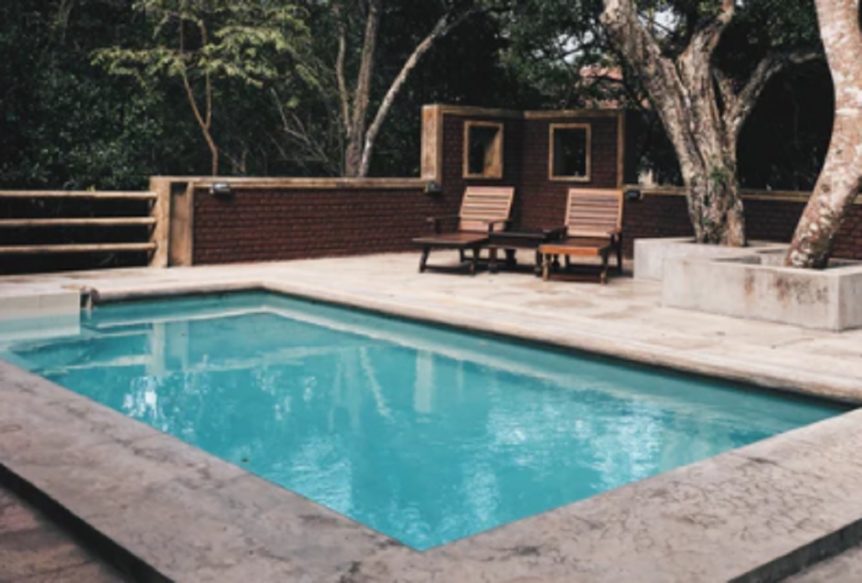Chlorine and pools are kind of like peanut butter and jelly. They just go together, right?
The truth is even though chlorine is the most common method for sanitizing your pool, you can treat a pool without chlorine.
If you’re looking for a healthier, safer alternative to chlorine, there are alternatives. They may cost more at first to implement, but may even save you on maintenance later.
Is Chlorine Dangerous?
Since chlorine is a chemical, it’s dangerous, right? Not always. In fact, cities treat drinking water with chlorine to sanitize it. However, it all depends on the levels of chlorine in the water. For instance, the EPA limits how much chlorine is used in drinking water because high amounts have been linked to cancer.
This may make you want to immediately learn how to treat a pool without chlorine. However, the same thing is true with using chlorine in pool water. It’s safe in small amounts, though if you do experience irritation, you may be more sensitive to chlorine, requiring an alternative sanitizer.
High levels of chlorine are dangerous. That’s why it’s critical to maintain the right balance at all times.
Saltwater Pools
Salt is a common way to treat a pool without chlorine. You’ll need special equipment to convert the salt to chlorine. Unlike the chlorine you add to your pool normally, this version is much milder and safer. You also reduce the risk of adding too much chlorine, which can be harmful.
By installing a salt sanitizer, water is converted into saltwater with approximately the same saltiness as your tears. There is a downside to this though.
Salt does make everyday pool maintenance easier. But, salt is harsh. It can corrode metal elements in and around your pool. Splashing can harm plants around the pool. It can also wear down your pool plaster faster. You’ll also need to replace the salt content every few years.
UV Pool Sanitization
If you don’t want any chlorine, even the tiny amount that comes with saltwater, in your pool, UV sanitization is the perfect alternative. As the name implies, ultra-violet light is used to sanitize the water.
By installing a special UV chamber in your pool, water filters in and is cleaned via UV light. It then filters back out into your pool, devoid of bacteria, algae and other issues. This method is even being used to create cleaner and safer drinking water in some areas of the world.
Obviously, the main downside is the cost of installing the equipment. Plus, you may notice an increase in energy usage. However, this is one of the safest and most effective ways to treat a pool without chlorine.
Treating With Ozone
What if you could use oxygen to clean your pool? Thanks to an ozonator installed in your pump, you can. This method involves taking oxygen from the air around you and turning it into ozone that’s distributed through your water.
It’s actually an FDA-approved water sanitizing method. The ozone destroys bacteria and even makes your water look clearer. If you’re still struggling with algae, you may still need to add a minimal amount of chlorine. However, the combination significantly reduces the chlorine levels in your pool, making it safer.
Using Bromine
While bromine is similar to chlorine in many ways, it’s not nearly as irritating to the skin. If you want to treat a pool without chlorine because chlorine irritates your skin and/or eyes, bromine is a good option. However, it is much more expensive than chlorine, which is why it’s not as commonly used.
Copper Ionization
While it might come as a surprise, copper works incredibly well for cleaning your pool. Plus, it doesn’t have the harsh side effects of chlorine. You’re not just dumping copper in your pool though. The process of copper ionization delivers copper ions to your pool water.
Not only is it effective against standard bacteria, but it can also fight black algae, which is one of the toughest to kill. Obviously, it does cost more, including the initial equipment necessary. However, you’ll save money on chlorine and reduce the amount of maintenance necessary.
No matter how you treat your pool water, regular cleaning is still a necessity. Contact us today to set up a cleaning schedule so you have more time to sit back, relax and enjoy your pool.
Image: Adheesha Paranagama
